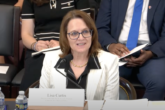March 12, 2019
The Hanoi Summit – We Asked Kristine Lee What Happens Next in U.S.-North Korea Relations
This past year, Kim Jong-un achieved foreign-policy breakthroughs long sought by his family’s regime through a combination of deft diplomacy, a burgeoning nuclear program, and low-level provocations against the United States and its allies. This has included inflammatory rhetoric, missile launches over Japanese airspace, and cyber-attacks on South Korean companies. There was, predictably, a pause in these provocations in the lead-up to the second Trump-Kim summit in February.
But in the aftermath of Hanoi, Pyongyang is likely to pivot away from a conciliatory tack with the United States. Just days after leader-level talks ground to halt, new evidence emerged suggesting that Pyongyang was rebuilding a missile launch site it had previously indicated it was dismantling. The lack of concerted response to such bad behaviors may ultimately solidify Pyongyang’s judgment that they are an effective long-term strategy for setting the terms of engagement with the United States.
Read the full article in The National Interest.
Read Neil Bhatiya's response.
More from CNAS
-
Assessing the Terror Threat Landscape in South and Central Asia and Examining Opportunities for Cooperation
Watch...
By Lisa Curtis
-
Indo-Pacific Security / Energy, Economics & Security
What Will North Korean Cybercrime Look Like in 2022?North Korean hackers will likely continue to employ more phishing campaigns in the future while tailoring their level of obfuscation based on the target’s sophistication....
By Jason Bartlett
-
Duyeon Kim testifies before European Parliament's Committee on Foreign Affairs
Chairman McAllister, Vice Chairs, DKOR Chairman Mandl, and distinguished Members of the Committee on Foreign Affairs and the European Parliament, thank you for the opportunity...
By Dr. Duyeon Kim
-
China’s New Land Borders Law Is a Nightmare for North Korean Refugees
A combination of high-level pressure from foreign governments and steady support for grassroots refugee resettlement organizations and programs is the most practical way to as...
By Jason Bartlett


